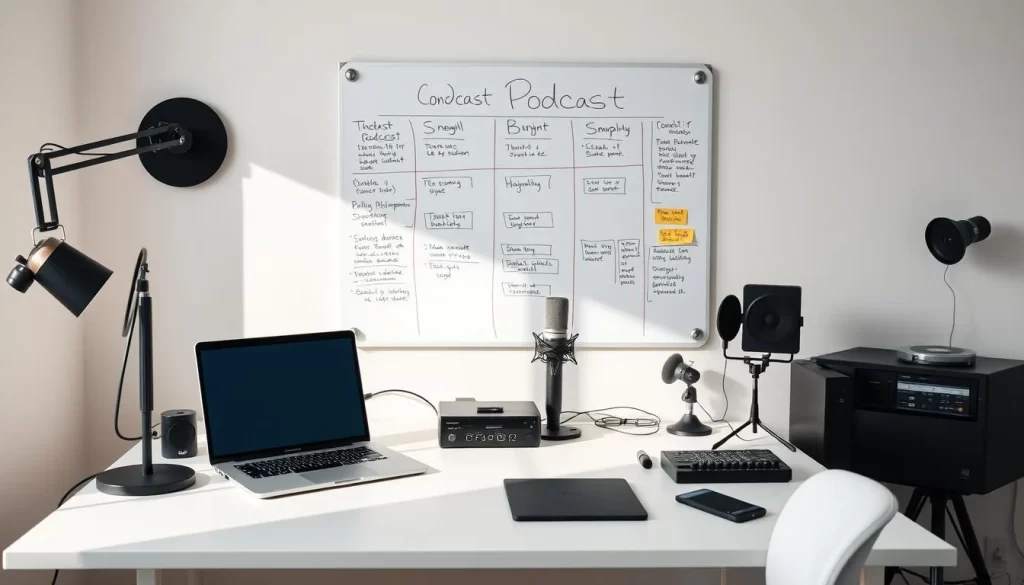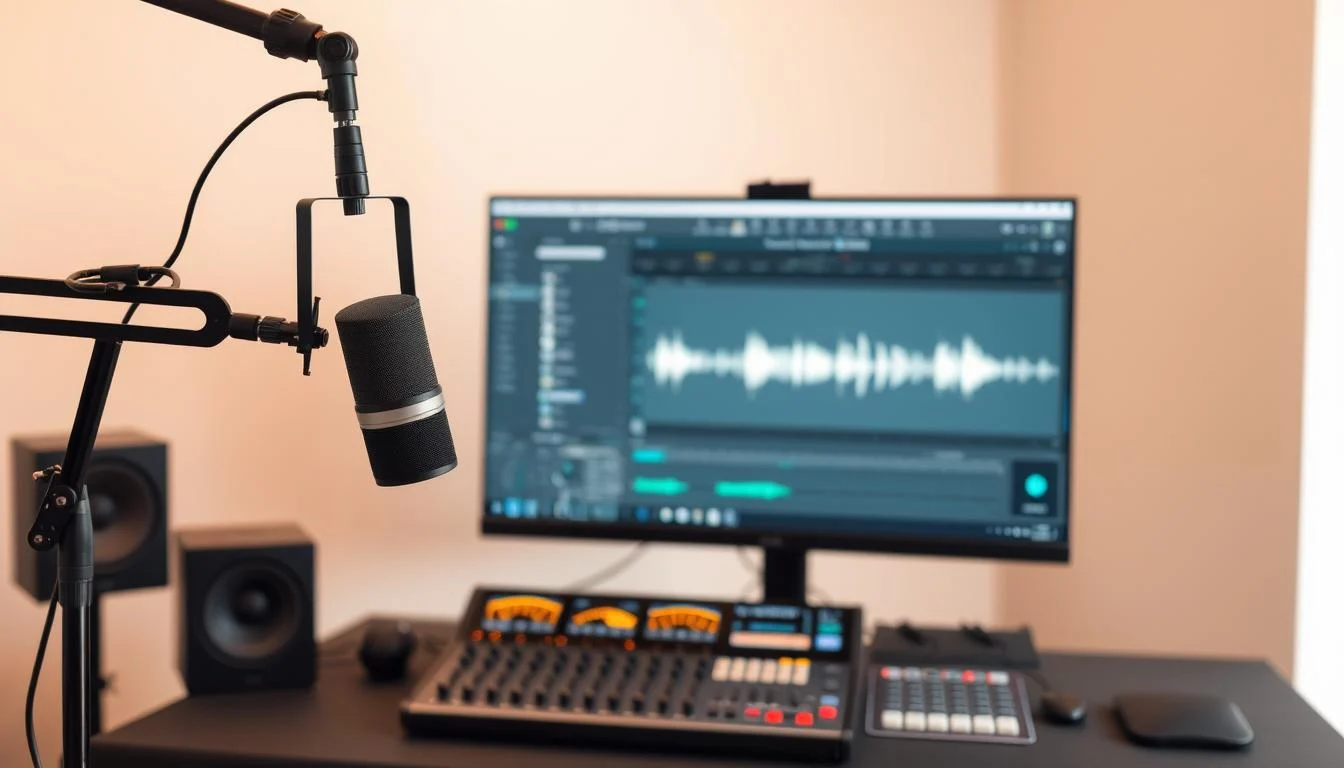As a podcaster, it’s key to manage your production process well. This ensures you deliver top-notch content to your listeners. Making your podcast workflow more efficient saves time. This lets you concentrate on making your content more engaging.
With a few easy steps, you can improve your workflow. Use tools like spreadsheets or task management apps to keep things organized. Also, set up a schedule to stay on track with your releases.
Key Takeaways
- Simplify your task management with organizational tools.
- Implement a scheduling system for timely releases.
- Focus on creating high-quality content.
- Reduce time spent on repetitive tasks.
- Enhance your overall production process.
Understanding the Podcast Workflow Fundamentals
Before starting a podcast, it’s key to know the basics of a podcast workflow. A good workflow helps creators manage their time well and stay organized. This is crucial for a successful podcasting journey.
Key Components of a Successful Workflow
A successful podcast workflow has several key components. These include planning, recording, editing, and publishing. Effective time management is vital for completing each stage well. Knowing these components helps podcasters create an efficient workflow.
Planning is the first step. It involves coming up with ideas, outlining episodes, and arranging guest appearances. This stage sets the tone for the whole production.
Common Workflow Challenges
Podcasters often face common workflow challenges. These include poor time management, disorganization, and bad planning. These issues can cause delays, lower productivity, and a poor final product.
Knowing these challenges helps podcasters take steps to avoid them. This ensures a smoother production process.
Setting Up Your Workflow Foundation
To beat common workflow challenges, setting up a solid foundation is crucial. This means creating clear processes for planning, recording, editing, and publishing. This improves organization and time management, making the workflow more efficient.
Understanding the basics of a podcast workflow and setting a solid foundation is key. It helps creators start a successful and lasting podcasting journey.
Creating an Efficient Pre-Production Process
Pre-production is key in podcasting. It saves time and reduces stress. This stage has several important steps for a successful podcast.
First, setting up a dedicated recording space is crucial. It should be quiet, comfy, and have all the recording tools. Good quality equipment like a top-notch microphone and headphones boost your podcast’s sound.
Next, developing a consistent editing process is vital. Pick the right editing software and make a template for your episodes. This keeps your podcast’s quality and tone the same in every episode.
Automation helps make your pre-production smoother. For example, using social media schedulers to promote your podcast saves a lot of time. Automating tasks like scheduling social media posts lets you focus on making great content.
Here are some tips to improve your pre-production:
- Plan your episodes ahead with a content calendar.
- Make a list of topics and guests you might have.
- Have a format for your episodes to keep things consistent.
By using these strategies, you can make your pre-production process more efficient. This will help your podcast succeed.
Essential Tools for Podcast Production
A good podcast needs the right tools. Organization and time management are key. The right tools help you work better, reduce stress, and make great content.
Start with good recording software and hardware. Adobe Audition and Audacity are popular choices. For better sound, use a Blue Yeti or Rode NT-USB microphone.
Recording Software and Hardware
The quality of your podcast depends on your tools. Look for software that’s easy to use, has good editing features, and works with your computer.
- Adobe Audition for advanced editing features
- Audacity for a free, user-friendly option
- Blue Yeti or Rode NT-USB for high-quality microphone options
Project Management Platforms
Project management platforms are vital for staying organized and on time. Tools like Trello, Asana, or Basecamp help you manage tasks, work with your team, and meet deadlines.
| Platform | Key Features | Collaboration |
|---|---|---|
| Trello | Boards, lists, and cards for task management | Yes, with assignments and due dates |
| Asana | Task and project tracking | Yes, with team and workflow management |
| Basecamp | Comprehensive project management with message boards and schedules | Yes, with multiple collaboration tools |
Content Planning Tools
Content planning is crucial for your podcast. Use Google Calendar or spreadsheets to plan your content. This helps keep your podcast consistent and on schedule.
Using these tools can make your podcast better. They help with organization, time management, and quality.
Mastering Your Podcast Workflow
Mastering your podcast workflow ensures your episodes are consistent and high-quality. It means knowing the whole process, from planning to publishing. You also need to find ways to work more efficiently.
Automation is key in this process. It helps you save time by automating tasks you do over and over. Tools and software can make your production smoother.

Having a set editing process is also important. Use templates and checklists to stay organized. This way, every episode will meet your quality standards.
Using social media schedulers can also boost your podcast’s promotion. Scheduling your posts ahead of time keeps your online presence steady. It also helps you connect with your audience better.
To really master your podcast workflow, keep improving it. Watch your production, find slow spots, and make changes when needed.
- Regularly review your workflow to identify areas for improvement.
- Implement automation tools to streamline repetitive tasks.
- Develop a consistent editing process using templates and checklists.
By following these steps and focusing on automation and efficiency, you can make a podcast workflow that works well and grows with you.
Time-Saving Recording Techniques
Recording is a key part of podcasting. Using the right techniques can make your workflow much smoother. As I work on making my podcast better, I’ve learned that the recording stage is very important for saving time.
Managing your time well during recording is crucial. I’ve started using batch recording. This means recording many episodes at once. It saves a lot of time and keeps your episodes sounding the same.
Batch Recording Strategies
Batch recording is great for podcasters who are always busy. Recording many episodes in one day cuts down on setup and teardown time. This lets you focus more on recording.
To make batch recording work, follow these tips:
- Make a content calendar ahead of time to keep things smooth.
- Set up your recording space to avoid distractions and make it efficient.
- Keep your episodes in a consistent format to make recording and editing easier.
Technical Setup Optimization
A good technical setup is key for efficient recording. This means using high-quality recording equipment and software. This can cut down on editing time a lot.
Always test your equipment before you start recording. Check the audio levels, microphone quality, and headphones to make sure everything is working right.
Managing Guest Coordination
Recording with guests needs good organization. This means coordinating schedules, preparing questions, and making sure all equipment is ready.
To make guest coordination easier, use project management tools. They help you keep track of schedules and communication. This saves time and makes recording smoother.
By using these time-saving recording techniques, you can make your podcast production more efficient. This means you can create higher quality content faster.
Streamlining Post-Production Tasks
Efficient post-production is key to a successful podcast. It helps you spend less time editing and more on creating great content.
Using editing software that automates tasks like noise reduction can save a lot of time. Experts say it improves quality too.
Templates and checklists make your workflow simpler. They help keep your episodes consistent.
For a better post-production process, use a task management system. This could be a spreadsheet or project management software. It helps you reduce post-production time and enhance your podcast’s quality.
By using automation and efficient workflows, you can elevate your podcast. This keeps you competitive in the podcasting world.
Automation Opportunities in Podcasting
As I work to make my podcast better, I’ve found that automation is key. It helps me do more with less effort. This way, I can spend more time on making great content and talking to my listeners.
Automation in podcasting covers many things. This includes how we share our shows, use social media, and track how well they do. Let’s look at these to see how automation can help you.
Publishing and Distribution Automation
One big plus of automation is how it lets you share your podcast everywhere at once. Tools like Podbean and Libsyn make this easy. They help your podcast reach more people without you having to do it all yourself.
Social Media Integration
Automation also helps a lot with social media. Tools like Hootsuite or Buffer let you plan your posts ahead of time. This saves you time and keeps your online presence steady.
Analytics and Tracking
Knowing how your podcast is doing is very important. Automation tools help you collect and understand this data. Google Analytics and Podtrac are great for this.
By using automation, you can make your podcast work better. You’ll do less manual work and focus more on making great content for your listeners.
Building Quality Control into Your Process
To make your podcast stand out, adding quality control is key. This means having a plan to check and improve your content before sharing it. This way, you can make your podcast better and keep it at a high level.
Using templates and checklists is a smart move for quality control. They make sure each episode is the same and all steps are followed. For example, a checklist before recording can check your gear. After, it helps with editing and publishing.
Experts say using social media schedulers is also important. A study found that it saves time and boosts your podcast’s visibility. It lets you plan and schedule your posts ahead of time.
“Consistency is key when it comes to podcasting. By scheduling your social media posts in advance, you can maintain a consistent presence and keep your audience engaged.”
Managing your time well is also vital for quality control. Giving enough time for checking and improving your content ensures it’s top-notch. Here’s a table showing how to split your time for different steps:
| Production Stage | Time Allocation |
|---|---|
| Pre-production | 20% |
| Recording | 30% |
| Post-production | 50% |
By adding quality control to your process and using tools like templates and social media schedulers, you can make your podcast workflow smoother. This way, you can create content that your audience will love.
Conclusion: Evolving Your Podcast Workflow for Long-Term Success
Changing your podcast workflow is key to lasting success in podcasting. By using smart automation, organization, and time management, you can make your workflow better and bigger. This makes your podcast more efficient and scalable.
Tools like spreadsheets or task management software can keep you organized and on track. Setting up a schedule for guest interviews and meetings, as experts suggest, saves time and cuts down stress. It makes your workflow smoother.
Automation in publishing, distribution, and social media can also boost your workflow. It helps you make great content regularly and share it well. This way, you can keep your podcast interesting and reach more people.
In the end, a good podcast workflow lets you focus on making great content and growing your audience. By always improving your workflow, you can keep up with the competition and succeed in podcasting for the long haul.
